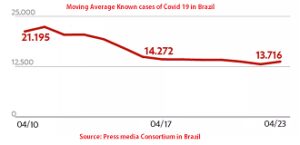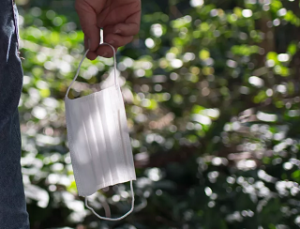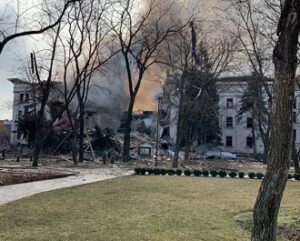
Posts Tagged ‘pandemia’
Covid Resilient and health policy
The reason why the falling Covid is so resilient in the country has two  explanations: the medical one, as the number of deaths falls slowly while the number of infections has a slower decline since the predominant variant is less lethal (see the graph in Brazil) and the other is a sanitary policy, since sanitary protocols are no longer used, except in rare environments.
explanations: the medical one, as the number of deaths falls slowly while the number of infections has a slower decline since the predominant variant is less lethal (see the graph in Brazil) and the other is a sanitary policy, since sanitary protocols are no longer used, except in rare environments.
It is not just about the economic fact, since all economic sectors have returned to activity and a global crisis is looming on the horizon due to a war that is escalating and is already affecting the food and fuel sector, with a very bleak future scenario.
However, there are activities that could be very well controlled, public parties (or private parties that have become an alternative), rules of operation in school environments and diverse cultural spaces (including religious ones) and the maintenance of masks since everyone has one.
The governors of the northeast (Brazilian) are already talking about the use of masks, but the real concern is with the drop in health investment levels and we may have other cases soon, such as the traditional viral waves at the beginning of winter and dengue.
A seminar with several international health authorities was held last Wednesday (2/23) with the theme “Global Health Agenda: Perspectives for 2022”, mediated by Fiocrus senior researcher Luiz Augusto Galvão.
All participants somehow expressed concern about safe health policies that guarantee control of the Pandemic, which is attenuated, but without guarantees of its end, Brazilian researcher Mariângela Batista Galvão Simão highlighted that a scenario of eradication of Covid is possible:
“That’s because today we have tools and know-how that we didn’t have before, but it won’t happen if we’re complacent,” he declared.
Covid: end of the state of emergency in Brazil
The state of Emergency in Public Health of National Importance (ESPIN) in Brazil was decreed by the then Minister of Health Henrique Mandetta, in February 2020, this weekend Minister Marcelo Queiroga declared the end of the Public Emergency, ESPIN started a cycle that allowed special funds for the purchase of supplies and vaccines to combat the pandemic.
(ESPIN) in Brazil was decreed by the then Minister of Health Henrique Mandetta, in February 2020, this weekend Minister Marcelo Queiroga declared the end of the Public Emergency, ESPIN started a cycle that allowed special funds for the purchase of supplies and vaccines to combat the pandemic.
The first official case was registered on February 26, 2020, making it more than 2 years ago, from then on it was a set of uncertain steps, opening and closing of establishments, bans on public gatherings, including cultural and religious events.
There is no declaration of a pandemic, nor an express release of safety protocols, as always the criteria are vague, such as the use of masks for example, which would be recommended.
The average number of deaths in the country is now around 100, having registered a very low number at the weekend, around 30 (the bodies that publish the numbers varied), but it must be remembered that the functioning of the secretariats of health on weekends is deficient.
It is difficult to predict the future of the disease with scientific data, experts warn, in general they draw two scenarios, one more optimistic that predicts the extinction of the virus and its variants, and another that predicts living with Covid-19 for a long time, which is considered more realistic, albeit at lower levels, and only in this case could it be considered endemic.
What is expected is serious monitoring and effective control of the circulation of the virus in the country.
Covid moving average drops, but variant already appears
According to data from FioCruz in March, the genomes of covid cases evaluated in patients infected with the BA.2 mutation (second lineage of the omicron) grew from 1.1% in February to 3.4% in March, it is 63% more transmissible and in Europe and the East it is already dominant.
cases evaluated in patients infected with the BA.2 mutation (second lineage of the omicron) grew from 1.1% in February to 3.4% in March, it is 63% more transmissible and in Europe and the East it is already dominant.
The moving average of both infections and deaths has been falling (see the table to the side) but there is nothing in Brazil other than monitoring, the testing policy does not exist and the protocols are already relaxed, to complicate the cold and the carnival outside of time that favors agglomerations.
The cold favors lung diseases and consequently the Covid that causes infections of this type is favored, in addition to other respiratory diseases typical of this season, the flu vaccination campaign is still in slow motion.
The federal government says it does monitoring, the state ones don’t even that, the discussion about whether to release it or not is now irrelevant, since the population, at its own risk, has already relaxed preventive measures and carnival parties, completely out of season, will take place, private or public.
What remains for us is special private care and the hope that the vaccination rate in the country, which is quite high, will definitely stop the advance of Covid 19, amid other supply and price crises that are already quite worrying on the horizon.
So it stays on everyone’s conscience, since it’s not just the individual problem, the pandemic taught us that it’s everyone’s problem, someone who doesn’t take care infects someone close.
Pain, Being and the Other
Pain is essential in existence, philosopher Byung Chul Han in the essay “The society palliates pain today” writes talking about the pandemic and the rediscovery of Being: “I feel pain, therefore I exist. We also owe the sensation of existence to pain. If it disappears entirely, substitutes are sought” (Han, Vozes, 2011, p. 65). But the pain of the Other is strange to us, writes Han: “The nakedness of the soul, the being exposed, the pain with the other, are entirely lost to us” (Han, p. 104), there is no compassion.
the essay “The society palliates pain today” writes talking about the pandemic and the rediscovery of Being: “I feel pain, therefore I exist. We also owe the sensation of existence to pain. If it disappears entirely, substitutes are sought” (Han, Vozes, 2011, p. 65). But the pain of the Other is strange to us, writes Han: “The nakedness of the soul, the being exposed, the pain with the other, are entirely lost to us” (Han, p. 104), there is no compassion.
That’s why the cruelty of war, the totalitarian leaders who expose this kind of contempt for the Other, for their pain, in the case of the Pandemic the number of dead are so anesthetized, it doesn’t hurt us so it doesn’t exist, which is a falsification of being , for it is Being only with-the-Other.
Megalothymia, the overvaluation of oneself, or of the social group to which one belongs, is both for Chul Han and for Fukuyama (who wrote “The End of History”, poorly read and interpreted), inspired by Nietzsche that this is the “last human being”, which reveals this type of anesthesia: “a little poison now and then: it gives pleasant dreams” (Han, p. 105).
It is important to understand why we admit death, even if unfair (of the innocent and those infected by the virus) because we do not imagine it as non-life, it does not hurt us, and the pain of the other is not felt, it can even be denounced by group aspects , but not as being and as Other. But it was not Nietzsche who “killed God”, not even the divine in us, the passion of the cross is pain-with-the-Other, it makes no sense but a divine Being who gives himself up for the Other, and there he is pure Being, it is divine Being.
When judging Jesus and even finding no crime, he hands him over to crucifixion, and even condemned the divine Being who will be subjected to a cruelty of thorns, scourging and finally crucifixion, still looks at the humanity of his executioners and says: “Father, forgive -them! They don’t know what they’re doing!” (Luke 23:34).
Who killed Jesus were the power of the Roman Empire, a face of totalitarian power, and the Pharisees: bad religion and misinterpretation of what should be our re-connection (true re-ligion) to the divine. Pain is essential in existence, philosopher Byung Chul Han in the essay “The society palliates pain today” writes talking about the pandemic and the rediscovery of Being: “I feel pain, therefore I exist. We also owe the sensation of existence to pain. If it disappears entirely, substitutes are sought” (Han, Vozes, 2021, p. 65).
HAN, B.C. (2021) Sociedade Paliativa: a dor hoje. Trans. Lucas Machado. Brazil, Petropolis: Ed. Vozes.
Covid 2.0: flexibility and new care
Except for China, which still makes strict lock downs, even countries that practiced confinement, such as Australia, New Zealand and South Korea, by easing protection measures, had in recent weeks a significant increase in cases by covid, even so they reopened.
countries that practiced confinement, such as Australia, New Zealand and South Korea, by easing protection measures, had in recent weeks a significant increase in cases by covid, even so they reopened.
I call it Covid 2.0, because Web 2.0 meant the arrival of the Web for everyone, yes most cases are few serious and there are many asymptomatic cases, but the virus circulates, and the number of deaths is around 200, which is the case from Brazil, means 1,400 per week, this is not a small amount.
In Europe, many countries, such as the United Kingdom, Denmark, France and Spain, had already relaxed public health policy measures, and there are already increases in Covid 2.0 cases there.
Worldwide, the number of cases has been falling, and the WHO itself is already waving a post-Covid scenario, what is worrying is that there is no policy for cases of outbreaks in certain regions and a clear policy of easing, and the number of cases small deaths, 1643 in the last few hours, contrasts with the number of infections: 777 thousand.
It is believed that the new variants will be less serious (China has already discovered a new variant), although not less infectious as BA.2 is already more infectious than the original Omicron, which explains the high number of infections.
It would be advisable to check and isolate regions with outbreaks and not fail to have some social protection, for example, distancing and masks, which is possible even with flexibility.
The hope that the new variants will be less aggressive and that the number will continue to fall is good, but not failing to take care is dangerous and now depends only on individual attitudes and giving support to needy regions that still have low vaccination rates.
On these days the HSE (Health Service Executive) – Irish public health service reported that the number of cases of hospitalizations for covid has grown again and is studying to apply the 4th. dose.
Error and the search for truth
The phrase is from the Russian writer Mikhail Saltykov-Tcherdrine, who wrote about the pseudonym M. Nepanov (wrote Contradictions), his phrase: “whoever never sought the truth certainly never made a mistake”, much better than the popular adage: “only whoever never tries is wrong”, because even if it is innocently, something is always tried.
who wrote about the pseudonym M. Nepanov (wrote Contradictions), his phrase: “whoever never sought the truth certainly never made a mistake”, much better than the popular adage: “only whoever never tries is wrong”, because even if it is innocently, something is always tried.
His sentence completes this thought: “There are times when society, seized with panic, deviates from science and seeks salvation in ignorance”, something that seems typical of our time: at first ignoring the pandemic and vaccines, then ignoring the dangers that result from it and finally try to live with it as if the disease were something natural, and the remedy is to vaccinate four, five, … times.
Folly and frivolity seem to be reactions to a crisis that is deepening, in addition to the war, a rise in prices and food shortages are looming, yes what happens for the time being seems to be circumvented and when it is no longer, what would be wise to do, it seems that few care.
I chose to speak of an unknown literary author of the 19th century, he did not live in the period of the Soviet Union, to attest to the ignorance of punishing Russian culture, science and sports, as a punishment for a war, undoubtedly unfair, but of the which the Russian people are also victims.
Even seeing the horrors happening in Ukraine, we cannot ignore the horrors of the West and the warlike escalation that may have in the near future other chapters as painful as the current ones, is an escalation that seems to have no return.
One cannot ignore the mistakes of the second war, the mistakes of the post-war period, the countless interventions in the East, Asia and Africa that caused wars and deaths that were equally reprehensible.
It is necessary to recognize the mistakes, it is necessary to forgive the colonial period, still in progress, and it is necessary to allow peoples to live their culture, their ideals, as developed by Raymond Aron (War and Peace between Nations) and in security, the The author quotes Clausewitz in his book: “War is an act of violence, and there are no limits to the manifestation of this violence” (Aron, p. 69).
It’s a difficult time when we just point out our mistakes to others, without looking at our own.
Why the Pandemic Isn’t Over
The hypotheses that vaccines are efficient against the variants of the Ômicron fall apart when it is observed that in the East and in Europe the variant BA.2, already called Ômicron 2.0, has a degree of infection 1.5% higher than the original strain and even where the number of deaths is falling, the degree of infection recedes at a slower rate.
Ômicron fall apart when it is observed that in the East and in Europe the variant BA.2, already called Ômicron 2.0, has a degree of infection 1.5% higher than the original strain and even where the number of deaths is falling, the degree of infection recedes at a slower rate.
In Brazil, the number of deaths is in the moving average around 250, while the number of infections is in a moving average that varies below 40 thousand and above 32 thousand, but if observed punctually, the number of infections on Thursday was 47,000 and Friday of 36,176 on Saturday, and there are still unreported cases of asymptomatic and there is no testing policy.
Imagining that the next strains may be less lethal can only be thought of in the field of hypotheses, although there are studies that even claim this, in fact, the explosion of cases in Europe and the East belies this possibility, as there are already reported deaths and low efficiency. of vaccines.
The release of protocols, it is true that not in all environments, some places continue to be more careful, but the political signaling of release leads to less care.
According to the WHO, BA.2 is associated with an increase in cases of Covid-19 in European and Eastern countries, and while at the end of January there was a drop in infections, in the period from the 14th to the 20th of this month the world body of health records an increase of 7% in infections, while the number of deaths there is a reduction of 23%, which means lower lethality of the strain.
The entity recorded 12.3 million new cases and 32,900 deaths from Covid-19 in the period.
There is undoubtedly a drop, but the greater spread of the new strain should be viewed with concern because it promotes the circulation of the virus and does not eliminate the possibility of mutations.
Neither plague nor war warns us
When the pandemic came, great global solidarity was expected, a retreat would make us go a little beyond our own ego, review many things, including our daily lives that are always running and often meaningless.
would make us go a little beyond our own ego, review many things, including our daily lives that are always running and often meaningless.
War should alert us to the brutality, cruelty and massacre that it provides and make us less warlike and more empathetic in everyday life and solidarity with the innocent who are the first to die in the face of brutality.
Generations who lived through the war told and wrote about its horrors, including the contemporary wars in Korea and Vietnam, it’s good not to forget, but the great revolution in the 60’s was the hippies criticizing consumerism, the peace and love generation, inspired by Ghandi and in several mystics, but something insensitive is in the air: the justification of cruelty that is paradoxical.
Paradoxical because the justification is the opposite of what is done: peace, liberation, the end of oppression and other slogans that are mere propaganda, because what is done is visibly contrary to what is preached, and this is in all areas. social, from culture to warlike thinking.
UN Secretary General António Guterrez in a speech called for an end to the “absurd” war, citing the city-to-city conquest made in Ukraine and the massacre in Mariupol, where 100,000 people tried to leave and are prevented, it is like a concentration camp. no walls.
Kiev had parks, churches and walkways that are the opposite of the war images (pictured is Kalynovka park near Kiev).
The economic war waged through western sanctions will have serious consequences for the supply, not only of fuel that was already suffering on the market even before the war, but the scarcity of food can lead to the third point of the crisis of civilization: hunger.
It is always possible to resume dialogue, negotiation, to prevent the proliferation of the war industry, which moves billions of dollars in a perverse market and which is on an increasing scale in the middle of a war, not to mention the nuclear danger that is a global reality.
We must cultivate empathy and solidarity, hope and especially the love that breaks the chain of hate that surrounds the entire planet, let us begin in our daily lives to lay down our weapons.
Relaxation of protocols and Covid 2.0
Several Brazilian states even allow the use of masks and other protocols in closed environments, initially they were only open environments, while several countries have had an increase in cases of covid 19 in recent days, among them: Germany, Austria, United Kingdom, China and South Korea, indicating that there could be a new planetary wave.
protocols in closed environments, initially they were only open environments, while several countries have had an increase in cases of covid 19 in recent days, among them: Germany, Austria, United Kingdom, China and South Korea, indicating that there could be a new planetary wave.
The increase in cases in these countries comes at a time when BA.2, called omicron 2.0, a “cousin sister” variant of the omicron (BA.1) is starting to become dominant, in the UK where there is a policy of testing, in the ninth period from February 27 to March 6, already indicated while the original omicron reached 31.1% of cases, the omicron 2.0 to 68.6% of cases.
When in 2005 the Web proliferated for all users it was called 2.0, with the policy of relaxing the measures, the dangerous idea of treating the contagion as endemic, Covid 2.0 is in practice creating the idea that there will be a policy to treat it as a “habitual” disease that can affect a population in a certain region, an original idea of denialism.
It is a fact that socially there is an anxiety for the return of normality, but social life with the growing crisis of markets, now aggravated by a war, and the return of agglomerations can become a global endemic, that is, it will not be confined to a certain region. .
The number of cases has been falling in Brazil, but more slowly in states where there was relaxation, as was the case of Rio de Janeiro, the first to allow the use of masks and without announcing a new vaccination period, even if it occurs, it should there is an interval of 4 months.
Experts question both the release of the use of masks and the absence of protocols in closed environments, although in public transport and hospitals they remain.
Many health bodies, including the WHO, are concerned about this relaxation.
Individual´s caution and patience are needed in this new Covid 2.0 process.
What harm did they do?
Amid the pandemic and a war that, although it was in a region, is becoming planetary, by the measures and positions, now from the Hague court that asks for an immediate ceasefire.
is becoming planetary, by the measures and positions, now from the Hague court that asks for an immediate ceasefire.
The ideological argument does not justify acts of barbarism neither the right nor the left, the growing polarization creates a climate of war where even humanitarian attitudes, and this includes the Pandemic, cannot be neglected, otherwise we will prolong its effects.
All humanitarian thinking wants a return to normality, which should be one that no longer takes us to the hustle and bustle of everyday life, unconcerned with injustices and calamities, including the Burnout Syndrome that Byung Chul Han talks about in his book.
It is also not about procrastinating people and society, since there are social and economic problems that require an attitude of work and community effort.
The misguided reasoning: “here it is done and here it is paid”, hides the cruelty behind attitudes that do not respect the humanitarian and health values necessary for a safe return to what is in fact a regenerated humanism as we try to develop in this week’s posts (in photo Mariupol´s Theatre).
This reasoning is also common in the religious environment, someone is rewarded because “it is good” and “punished” because it is bad, what the children and civilians in Ukraine did badly, the elderly people, doctors and nurses who died in the Pandemic and finally those who are still dying.
For those who make this reasoning that is not religious, God favored or punished someone, I remember the passage in which the Galileans go to Jesus saying that Pilate had killed people and mixed their blood with the sacrifices that were offered to false gods.
Seeing the reasoning “God punished them”, Jesus answers them (Lk 13:2): “Do you think that these Galileans were more sinful than all the other Galileans, because they suffered such a thing? 3I tell you no. But if you do not convert, you will all die in the same way”, to say that cruelty and sin can spread cruelty throughout the world.
He cites the tragedy known at the time, the death of workers who worked in the Tower of Siloam and explains that they were victims of the tragedy and were just workers.
Condemning cruelty, preventing health and humanitarian attitudes with actions is to avoid these evils.

